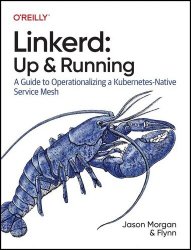Linkerd: Up and Running: A Guide to Operationalizing a Kubernetes-native Service Mesh
- Добавил: literator
- Дата: 18-04-2024, 19:42
- Комментариев: 0
 Название: Linkerd: Up and Running: A Guide to Operationalizing a Kubernetes-native Service Mesh
Название: Linkerd: Up and Running: A Guide to Operationalizing a Kubernetes-native Service MeshАвтор: Jason Morgan and Flynn
Издательство: O’Reilly Media, Inc.
Год: 2024
Страниц: 150
Язык: английский
Формат: epub (true)
Размер: 10.1 MB
With the massive adoption of microservices, operators and developers face far more complexity in their applications today. Service meshes can help you manage this problem by providing a unified control plane to secure, manage, and monitor your entire network. This practical guide shows you how the Linkerd service mesh enables cloud-native developers—including platform and site reliability engineers—to solve the thorny issue of running distributed applications in Kubernetes.
Jason Morgan and Flynn draw on their years of experience at Buoyant—the creators of Linkerd—to demonstrate how this service mesh can help ensure that your applications are secure, observable, and reliable. You'll understand why Linkerd, the original service mesh, can still claim the lowest time to value of any mesh option available today.
When the Linkerd2 rewrite started, the Rust programming language had been gaining attention for its memory safety, which enables developers to write code that avoids many of the memory management vulnerabilities inherent to C and C++, while still compiling to native code for high performance. The downside was that Rust’s networking support was sometimes lacking features needed by Linkerd2; in many cases, the Linkerd2 developers ended up adding these features to Rust crates like hyper and tokio. The driver behind the decisions to focus on Kubernetes and to create a purpose-built proxy was operational simplicity: the idea that a project should be able to deliver functionality and performance while still being simple to learn and use. This concept has had a tremendous impact on the Linkerd project as a whole, and it continues to be a major focus of Linkerd’s development.
• Learn how Linkerd works and which tasks it can help you accomplish
• Install and configure Linkerd in an imperative and declarative manner
• Secure interservice traffic and set up secure multicluster links
• Launch a zero trust authorization strategy in Kubernetes clusters
• Organize services in Linkerd to override error codes, set custom retries, and create timeouts
• Use Linkerd to manage progressive delivery and pair this service mesh with the ingress of your choice
Who Should Read This Book:
This book is meant to help anyone who thinks it’s easier to get things done when creating, running, or debugging microservices applications, and is looking to Linkerd to help with that. While we think that the book will benefit people who are interested in Linkerd for its own sake, Linkerd—like computing itself—is ultimately a means, not an end. This book reflects that. Beyond that, it doesn’t matter to us whether you’re an application developer, a cluster operator, a platform engineer, or whatever; there should be something in here to help you get the most out of Linkerd. Our goal is to give you everything you need to get Linkerd up and running to help you get things done. You’ll need some basic knowledge of Kubernetes, the overall concept of running things in containers, and the Unix command line to get the most out of this book. Some familiarity with Prometheus, Helm, Jaeger, etc. will also be helpful, but isn’t really critical.
Скачать Linkerd: Up and Running: A Guide to Operationalizing a Kubernetes-native Service Mesh
Внимание
Уважаемый посетитель, Вы зашли на сайт как незарегистрированный пользователь.
Мы рекомендуем Вам зарегистрироваться либо войти на сайт под своим именем.
Уважаемый посетитель, Вы зашли на сайт как незарегистрированный пользователь.
Мы рекомендуем Вам зарегистрироваться либо войти на сайт под своим именем.
Информация
Посетители, находящиеся в группе Гости, не могут оставлять комментарии к данной публикации.
Посетители, находящиеся в группе Гости, не могут оставлять комментарии к данной публикации.
